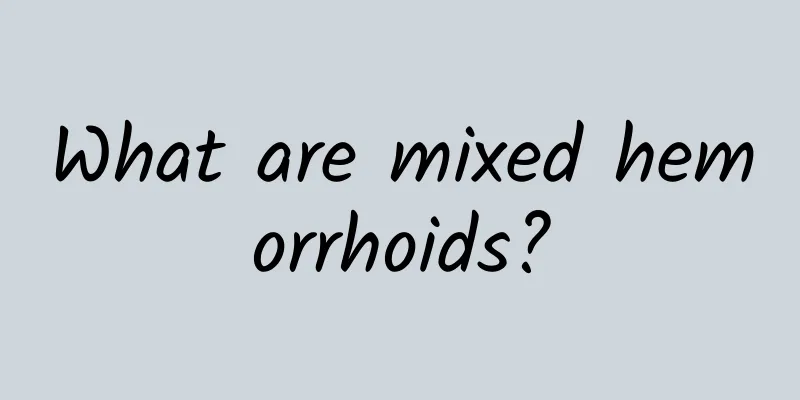What are mixed hemorrhoids?

|
Mixed hemorrhoids are a type of hemorrhoids. Usually, patients will experience bloody stools, hemorrhoid prolapse, or local itching symptoms, which have a significant impact on the patient's diet and daily life. Therefore, if this situation is found, effective treatment should be emphasized. 1. Blood in stool: It is characterized by painlessness, intermittentness, and the presence of bright red blood after defecation. It is also a common symptom of internal hemorrhoids or mixed hemorrhoids in the early stages. Blood in the stool is mostly caused by feces abrading the mucosa or forceful defecation, which causes dilated blood vessels to rupture and bleed. In mild cases, there is usually heavy bleeding or blood on toilet paper, followed by dripping blood. In severe cases, there is spurting bleeding, which often stops on its own after a few days. This has important implications for diagnosis. Constipation, hard and dry stools, drinking alcohol and eating spicy foods are all causes of bleeding. If bleeding occurs repeatedly over a long period of time, anemia may occur, which is not uncommon in clinical practice and should be differentiated from hemorrhagic diseases. 2. Hemorrhoid prolapse : This is often a late symptom, with blood in the stool occurring first and then prolapse. In the late stage, the hemorrhoids enlarge and gradually separate from the muscle layer, and are pushed out of the anus during defecation. In mild cases, the hemorrhoids will only prolapse during defecation and will return to their original position on their own after defecation. In severe cases, they need to be pushed back in by hand. In more serious cases, they will prolapse out of the anus when the abdominal pressure is slightly increased, such as when coughing or walking, and the hemorrhoids will prolapse, making it difficult to return and making it impossible to participate in labor. A few patients report prolapse as the first symptom. 3. Pain : Simple internal hemorrhoids are painless, and a few may have a feeling of heaviness and distension. When internal hemorrhoids or mixed hemorrhoids prolapse and become incarcerated, and edema, infection, and necrosis occur, there will be varying degrees of pain. 4. Itching : In late-stage internal hemorrhoids, prolapsed hemorrhoids and relaxation of the anal sphincter, secretions often flow out. Due to the irritation of the secretions, there is often itching and discomfort around the anus, and even skin eczema may occur, which makes the patient extremely uncomfortable. 5. Mucus overflow: The rectal mucosa is stimulated by hemorrhoids for a long time, causing inflammatory exudation and increased secretions. When the anal sphincter relaxes, it can flow out at any time, causing the anal skin to be frequently irritated and cause eczema and itching. |
<<: How to treat a broken nose correctly
>>: What are the symptoms of spinal fasciitis? Is it serious?
Recommend
What are the symptoms of blood dryness and dampness?
Dryness, heat and dampness can easily cause patie...
The effect of goose not eating grass
Goosegrass is a wild plant belonging to the Aster...
The efficacy and function of the traditional Chinese medicine Nanxing
Many people have heard of the Chinese medicinal m...
Nature and flavor of Chinese date seeds
In many traditional Chinese medicine formulas, we...
Symptoms of lumbar disc herniation
Lumbar disc herniation brings great pain to patie...
How to stand with lumbar disc herniation
Lumbar disc herniation is very troublesome for yo...
Symptoms of sequelae of cerebral infarction
Diseases like cerebral infarction really have a h...
What to do if you have trouble breathing due to anxiety?
After suffering from anxiety disorder, people wil...
Should Gorgon Fruit be Stir-fried to Remove Dampness?
Fuling is a common food in daily life. Many peopl...
Causes, treatments and prevention of abdominal cramps in children
Abdominal cramps are a common symptom in children...
Which season is best for moxibustion?
In fact, people have realized a long time ago tha...
What is the problem of poor absorption?
Poor absorption is mainly caused by poor absorpti...
Can my aunt take vitamin C?
For women, diet during menstruation is very impor...
Foods that help to produce phlegm and dampness have good effects
Chinese medicine has many dietary therapies, and ...
Can gout patients eat green beans?
French beans are a relatively common vegetable. T...









